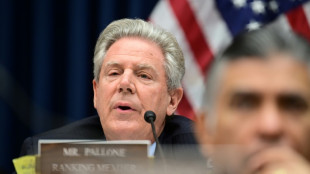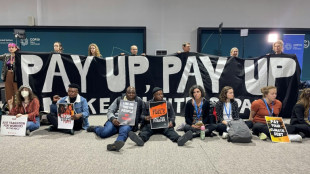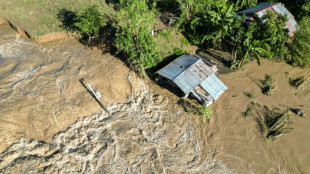
-
 NATO holds large Arctic exercises in Russia's backyard
NATO holds large Arctic exercises in Russia's backyard
-
Trouble brews in India's Manipur state

-
 Son of Norwegian princess arrested on suspicion of rape
Son of Norwegian princess arrested on suspicion of rape
-
Romanian court says 'irregularities' in influencer Andrew Tate's indictment

-
 Iran faces fresh censure over lack of cooperation at UN nuclear meeting
Iran faces fresh censure over lack of cooperation at UN nuclear meeting
-
Despondency and defiance as 45 Hong Kong campaigners jailed

-
 Scholar, lawmakers and journalist among Hong Kongers jailed
Scholar, lawmakers and journalist among Hong Kongers jailed
-
European stocks slide on fears of Russia-Ukraine escalation

-
 Police break up Georgia vote protest as president mounts court challenge
Police break up Georgia vote protest as president mounts court challenge
-
Spain royals visit flood epicentre after chaotic trip

-
 France's Gisele Pelicot says 'macho' society must change attitude on rape
France's Gisele Pelicot says 'macho' society must change attitude on rape
-
G20 leaders talk climate, wars -- and brace for Trump's return

-
 US lawmaker accuses Azerbaijan in near 'assault' at COP29
US lawmaker accuses Azerbaijan in near 'assault' at COP29
-
Tuchel's England have 'tools' to win World Cup, says Carsley

-
 Federer hails 'historic' Nadal ahead of imminent retirement
Federer hails 'historic' Nadal ahead of imminent retirement
-
Ukraine vows no surrender, Kremlin issues nuke threat on 1,000th day of war

-
 Novo Nordisk's obesity drug Wegovy goes on sale in China
Novo Nordisk's obesity drug Wegovy goes on sale in China
-
Spain royals to visit flood epicentre after chaotic trip: media

-
 French farmers step up protests against EU-Mercosur deal
French farmers step up protests against EU-Mercosur deal
-
Rose says Europe Ryder Cup stars play 'for the badge' not money

-
 Negotiators seek to break COP29 impasse after G20 'marching orders'
Negotiators seek to break COP29 impasse after G20 'marching orders'
-
Burst dike leaves Filipino farmers under water

-
 Markets rally after US bounce as Nvidia comes into focus
Markets rally after US bounce as Nvidia comes into focus
-
Crisis-hit Thyssenkrupp books another hefty annual loss

-
 US envoy in Lebanon for talks on halting Israel-Hezbollah war
US envoy in Lebanon for talks on halting Israel-Hezbollah war
-
India to send 5,000 extra troops to quell Manipur unrest

-
 Sex, drugs and gritty reality on Prague's underworld tours
Sex, drugs and gritty reality on Prague's underworld tours
-
Farmers descend on London to overturn inheritance tax change

-
 Clippers upset Warriors, Lillard saves Bucks
Clippers upset Warriors, Lillard saves Bucks
-
Acquitted 'Hong Kong 47' defendant sees freedom as responsibility

-
 Floods strike thousands of houses in northern Philippines
Floods strike thousands of houses in northern Philippines
-
Illegal farm fires fuel Indian capital's smog misery

-
 SpaceX set for Starship's next flight, Trump expected to attend
SpaceX set for Starship's next flight, Trump expected to attend
-
Texans cruise as Cowboys crisis deepens

-
 Do the Donald! Trump dance takes US sport by storm
Do the Donald! Trump dance takes US sport by storm
-
Home hero Cameron Smith desperate for first win of 2024 at Australian PGA

-
 Team Trump assails Biden decision on missiles for Ukraine
Team Trump assails Biden decision on missiles for Ukraine
-
Hong Kong court jails 45 democracy campaigners on subversion charges

-
 Several children injured in car crash at central China school
Several children injured in car crash at central China school
-
Urban mosquito sparks malaria surge in East Africa

-
 Djibouti experiments with GM mosquito against malaria
Djibouti experiments with GM mosquito against malaria
-
Pulisic at the double as USA cruise past Jamaica

-
 Many children injured after car crashes at central China school: state media
Many children injured after car crashes at central China school: state media
-
Asian markets rally after US bounce as Nvidia comes into focus

-
 Tens of thousands march in New Zealand Maori rights protest
Tens of thousands march in New Zealand Maori rights protest
-
Five takeaways from the G20 summit in Rio

-
 China, Russia ministers discuss Korea tensions at G20: state media
China, Russia ministers discuss Korea tensions at G20: state media
-
Kohli form, opening woes dog India ahead of Australia Test series

-
 Parts of Great Barrier Reef suffer highest coral mortality on record
Parts of Great Barrier Reef suffer highest coral mortality on record
-
Defiant Lebanese harvest olives in the shadow of war


Argentina's Falklands obsession thrives 40 years after war
Whether it is found in children's school books, on bank notes, murals and road signs, tattooed on people's bodies or even as an article in the constitution, Argentina's claim to the Falkland Islands is a national obsession.
Forty years since Argentina launched its disastrous invasion of the tiny South Atlantic archipelago, which covers 12,000 square kilometers (4,600 square miles), the political powers in the South American country show no signs of giving up hope of somehow claiming the islands, as well as the island of South Georgia.
"The recovery of the said territories and the full exercise of sovereignty... constitute a permanent and irrevocable objective of the Argentine people," says the Constitution, written in 1994.
Lying about 300 miles (480 kilometers) from the Argentine coast, the rocky wind-beaten islands are home to 3,500 mostly British people, some of whom can trace their ancestry on the islands back 10 generations.
It is officially a British Overseas Territory, but Argentina claims that the islands should be theirs.
And wherever you travel in Argentina, there are constant reminders of the state policy: signs proclaiming "Las Malvinas son Argentinas," using the Spanish name for the Falklands and asserting ownership.
Murals also show the shape of the islands, often painted in the sky blue of the Argentine flag and with the words "We will return" emblazoned next to it -- a reference to the Argentine belief that it once had a settlement in the islands.
In many towns and cities, road signs specify the distance to the Falklands.
Every April 2, a day marking the Argentine invasion, school children sing the official 1941 hymn claiming the islands.
- Falklands bring Argentines together -
Throughout the country, football stadiums, towns, hundreds of roads and even the 50 pesos bill carry the name "Argentine Malvinas."
"Argentina is a complex country with many cracks, there are few issues that" bring people together, said Edgardo Esteban, director of the Malvinas Museum in Buenos Aires.
"The Falklands is one, it's like the national football team."
In a 2021 survey of 5,000 people, more than 81 percent said the country should continue to claim sovereignty over the islands. Only 10 percent said it should stop.
Governments also have been keen to continue, although not always in the same way.
Argentina has clung to a non-binding 1965 United Nations resolution that recognized a sovereignty dispute, dating back to the 1830s, and invited the Argentine and UK governments to negotiate a solution.
The South American country has been less enthusiastic to acknowledge the right to self-determination enshrined in the UN Charter -- and which the Falkland islanders exercised in 2013 when 99.8 percent of them voted to remain British.
Argentina long sought to achieve its claims by diplomatic means, but that was dramatically abandoned by the military dictatorship in its ill-fated 1982 invasion.
- 'A national claim' -
"What Europe cannot understand is how a people could hail the dictators" following the invasion, the 1980 Nobel Peace Prize winner Adolfo Perez Esquivel said recently.
"It was very difficult to explain that the Falklands were a national claim and not support for the dictatorship."
Following the war, which ended on June 14 with Argentina's surrender to a British expeditionary force sent by the government, there was a period when the issue was put on the back burner.
Diplomatic and commercial relations were reestablished in 1989, while the Argentines adopted an unsuccessful policy of trying to seduce the "kelpers," as the islands' inhabitants are known.
"But since 1982, the discourse on the Falklands has remained a prisoner to the scars of the war," said Esteban.
The Peronist governments of Nestor and Cristina Kirchner (2003-2015) used the Falklands issue as a rallying cry to drum up support, whereas the liberal Mauricio Macri (2015-2019) showed far less interest.
At the Malvinas Museum, created in 2014 under the government of Cristina Kirchner, the nationalist narrative is nourished for future generations.
And while the museum does mention the war, it prefers to focus on "geological unity," the "continental maritime shelf" or the pioneering presence of Argentine scientists in Antarctica to push its claims.
It even talks about elephant seals that have been traced making journeys between the islands and the South American continent.
Proof, it would seem, that even aquatic mammals support the Argentine claim to the Falklands.
E.Hall--AT
